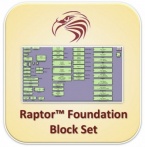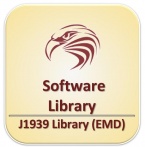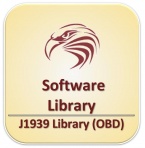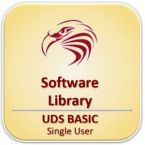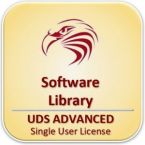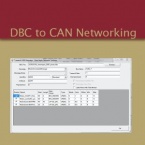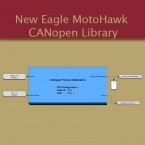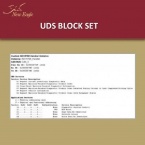Libraries: Difference between revisions
No edit summary |
|||
| (12 intermediate revisions by 3 users not shown) | |||
| Line 1: | Line 1: | ||
== | ==Electric Vehicle Development Platform (EVDP) == | ||
New | New Eagle has built the EVDP to speed the development of both prototype and production EV vehicle software. The Base model of the EVDP, built-in Mathworks Simulink & Stateflow, is the starting point for your electric vehicle supervisory controller. You get the most common control strategies for EV applications such as core startup/shutdown, drive mode, charging, torque request, regenerative braking, and transmission control. The major components are structured as libraries, which allows for parallel model development by multiple team members. | ||
The | |||
New Eagle’s Electric Vehicle Development Platform offers common EV system component libraries with the base model that provide teams the ability to quickly build and easily adjust the software using the Raptor embedded Model-Based Design (eMBD) platform. | |||
New Eagle offers two options for providing the EV supervisory software template. Click below to learn more. | |||
[[File:learn-more-button.jpg|100px |link=https://wiki.neweagle.net/index.php?title=EV-Components#Supervisory_Controller]] | [[File:learn-more-button.jpg|100px |link=https://wiki.neweagle.net/index.php?title=EV-Components#Supervisory_Controller]] | ||
| Line 33: | Line 25: | ||
|style = "height:150px; width:180px;"| | |style = "height:150px; width:180px;"| | ||
NE-RAP-BLK-01 | |||
|style = "height:150px; width:180px;"| | |style = "height:150px; width:180px;"| | ||
| Line 46: | Line 38: | ||
|} | |} | ||
==J1939 | ==J1939 Library == | ||
New Eagle's J1939 Library offers an easy-to-use approach to add J1939 protocol support | New Eagle's J1939 Library offers an easy-to-use approach to add J1939 protocol support any Raptor project and mirrors the J1939 network structure of PGN’s and SPN’s. The diagnostic messages integrate seamlessly with the built-in Fault Manager blocks, and it supports data layer, application layer and network management of J1939. Two library options are available: EMD and OBD. | ||
{| class="wikitable" style="text-align: center;" cellpadding = "4" | {| class="wikitable" style="text-align: center;" cellpadding = "4" | ||
| Line 59: | Line 51: | ||
[[File:p-9225-image_785.jpg|145px]] | [[File:p-9225-image_785.jpg|145px]] | ||
|style = "height:150px; width: | |style = "height:150px; width:180px;"| | ||
RAP-SW-J1939-EMD-LIB<br> | |||
RAP-SM-J1939-EMD-LIB<br> | |||
NE-J1939-EMD-LIB | |||
|style = "height:150px; width:180px;"| | |style = "height:150px; width:180px;"| | ||
| Line 81: | Line 73: | ||
[[File:p-9227-image_786.jpg|145px]] | [[File:p-9227-image_786.jpg|145px]] | ||
|style = "height:150px; width: | |style = "height:150px; width:180px;"| | ||
RAP-SW-J1939-OBD-LIB <br>RAP-SM-J1939-OBD-LIB <br> NE-J1939-OBD-LIB | |||
|style = "height:150px; width:180px;"| | |style = "height:150px; width:180px;"| | ||
| Line 141: | Line 133: | ||
|} | |} | ||
==Engine Control Software== | |||
New Eagle’s Base ECM Software enables rapid engine control development. The software comes initially configured with common I/O and strategies but is built for easy customization to customer requirements. This solution avoids a blank sheet starting point: the base model contains control strategies validated over years of projects and represents New Eagle’s state-of-the-art engine control know-how. | |||
The offering consists of four parts: | |||
:*Base ECM Software | |||
:*Torque Path Add-On | |||
:*J1939/OBD Tasks Add-On | |||
:*OBD Major Monitors Add-On | |||
[[File:learn-more-button.jpg|100px |link=https://www.neweagle.net/support/wiki/index.php?title=Engine_Control]] | |||
==Obsolete== | ==Obsolete== | ||
| Line 197: | Line 200: | ||
|style = "height:150px; width:180px;"| | |style = "height:150px; width:180px;"| | ||
'''[https://www.neweagle.net/support/wiki/ProductDocumentation/NewEagleSoftware/NE-MH-BLK-01_Datasheet_v0.0.pdf | '''[https://www.neweagle.net/support/wiki/ProductDocumentation/NewEagleSoftware/NE-MH-BLK-01_Datasheet_v0.0.pdf Datasheet]''' | ||
|style = "height:150px; width:180px;"| | |style = "height:150px; width:180px;"| | ||
'''[ | '''[[Foundation_Block_Set|More Details]]''' | ||
<!--[http://www.neweagle.net/support/wiki/index.php?title=Foundation_Block_Set MotoHawk Controls Foundation Blockset]--> | <!--[http://www.neweagle.net/support/wiki/index.php?title=Foundation_Block_Set MotoHawk Controls Foundation Blockset]--> | ||
|} | |} | ||
| Line 255: | Line 258: | ||
|style = "height:150px; width:180px;"| | |style = "height:150px; width:180px;"| | ||
'''[[Unified Diagnostic Services| | '''[[Unified Diagnostic Services|More Details]]''' | ||
|} | |} | ||
Latest revision as of 15:37, 22 May 2024
Electric Vehicle Development Platform (EVDP)
New Eagle has built the EVDP to speed the development of both prototype and production EV vehicle software. The Base model of the EVDP, built-in Mathworks Simulink & Stateflow, is the starting point for your electric vehicle supervisory controller. You get the most common control strategies for EV applications such as core startup/shutdown, drive mode, charging, torque request, regenerative braking, and transmission control. The major components are structured as libraries, which allows for parallel model development by multiple team members.
New Eagle’s Electric Vehicle Development Platform offers common EV system component libraries with the base model that provide teams the ability to quickly build and easily adjust the software using the Raptor embedded Model-Based Design (eMBD) platform.
New Eagle offers two options for providing the EV supervisory software template. Click below to learn more.
Controls Foundation Blockset
The Foundation Blockset is one of the many Component Libraries that New Eagle has to offer. It includes many different types of blocks, including controller blocks (PI, PID, etc.), integrators, filters and many common control elements. This blockset can help jump start your development by providing proven, tested and calibratable implementations of common model building blocks.
| Picture | Part Number | Webstore | Downloads | More Information |
|---|---|---|---|---|
|
NE-RAP-BLK-01 |
J1939 Library
New Eagle's J1939 Library offers an easy-to-use approach to add J1939 protocol support any Raptor project and mirrors the J1939 network structure of PGN’s and SPN’s. The diagnostic messages integrate seamlessly with the built-in Fault Manager blocks, and it supports data layer, application layer and network management of J1939. Two library options are available: EMD and OBD.
| Picture | Part Number | Webstore | Downloads | More Information |
|---|---|---|---|---|
|
RAP-SW-J1939-EMD-LIB |
||||
|
RAP-SW-J1939-OBD-LIB |
Unified Diagnostic Services (UDS)
New Eagle's UDS Library offers an easy-to-use approach to add UDS protocol support to any MotoHawk or Raptor project and includes implementation based on ISO 14229, ISO 15031 and ISO 15765. The diagnostic messages integrate seamlessly with the built-in Fault Manager blocks, and it supports the network, transport, session and application layers with a convenient, easy-to-use Simulink block interface.
- ISO Blockset provides interface to PC-based diagnostics application or hand-held scan tool.
| Picture | Part Number | Webstore | Downloads | More Information |
|---|---|---|---|---|
|
RAP-SW-UDS-BASIC-LIB |
Please contact sales | |||
|
RAP-SW-UDS-ADV-LIB |
Please contact sales |
Engine Control Software
New Eagle’s Base ECM Software enables rapid engine control development. The software comes initially configured with common I/O and strategies but is built for easy customization to customer requirements. This solution avoids a blank sheet starting point: the base model contains control strategies validated over years of projects and represents New Eagle’s state-of-the-art engine control know-how. The offering consists of four parts:
- Base ECM Software
- Torque Path Add-On
- J1939/OBD Tasks Add-On
- OBD Major Monitors Add-On
Obsolete
DBC CAN Networking Toolbox for MotoHawk
The DBC CAN Networking Toolbox allows you to easily create CAN input and output blocks using DBC files. This tool box complements the New Eagle libraries for New Eagle J1939 Library implementation as well as a CANopen client library.
- DBC to CAN Networking
- New Eagle's Network Toolbox makes it easy to create CAN input and output blocks.
- Network Toolbox enables you to have useful CAN blocks starting from an industry-standard *.dbc file to describe the CAN network.
- Saves development and debugging time and reduces complexity.
- Create custom *.dbc files
- More Information: DBC CAN Networking Toolbox
| Picture | Part Number | Webstore | Downloads | More Information |
|---|---|---|---|---|
|
NE-MH-DBC-CAN-01 |
Controls Foundations Library for Motohawk
| Picture | Part Number | Webstore | Downloads | More Information |
|---|---|---|---|---|
|
NE-MH-BLK-01 |
- |
CANopen Library for Motohawk
The CANopen Library makes it easy to initialize and to communicate using the CANopen Protocol. Instead of manually writing code to handle the initialization sequence and other protocol status messages, by dropping a few key blocks into a Simulink model, the CANopen Library enables you to establish the communication protocol quickly. This saves development and debugging time and reduces complexity.
| Picture | Part Number | Webstore | Downloads | More Information |
|---|---|---|---|---|
|
NE-MH-CANOPEN-LIB-001 |
- |
- |
- |
UDS Library for Motohawk
| Picture | Part Number | Webstore | Downloads | More Information |
|---|---|---|---|---|
|
MH_UDS_BLOCK |
- |
- |
